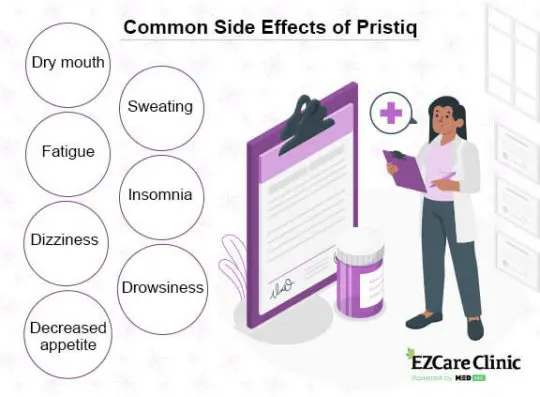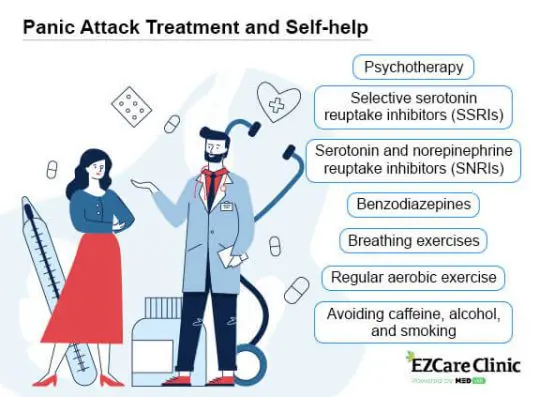Panic disorder affects more than
Although the FDA only approved this drug for treating depression, doctors often prescribe it as an off-label medication for panic attacks and social or generalized anxiety.
Panic attacks may be a scary experience, but you have the power to manage them. Consult a doctor online to know more.
Using Pristiq for Panic Disorder
Antidepressants have proven
Neurotransmitters are brain chemicals that regulate various physiological processes; they are responsible for relaying messages between brain cells. Some researchers believe that people with mental health issues have an abnormal balance of these chemical messengers.
The neurotransmitter serotonin and norepinephrine play a role in mood and sleep control. Pristiq affects the levels of these neurotransmitters.
Pristiq Dosage for Panic Disorder
A doctor will prescribe a Pristiq dosage depending on several factors, including the patient’s liver and kidney health. Patients may notice a difference between a Pristiq for anxiety and Pristiq for panic disorder dosage.
Pristiq medication is available in extended-release tablet form with three different dosages, including 25 mg, 50 mg, and 100 mg. Normal dosage ranges between 50 mg and 400 mg daily. Patients should take the recommended dosage orally once daily, with or without food.
The doctor or pharmacist will decide the optimal dosage for a person’s needs. Doctors always recommend starting panic attack treatment with a low dose and gradually raising it as needed to limit the likelihood of undesired effects.
Patients should not use this medication more frequently or for longer than prescribed. They won’t get better success or quicker results by doing so, but they will only invite adverse side effects.
Pristiq Side Effects
Pristiq, like any other drug, may cause some side effects. It has both common and severe ones.
Common Side Effects
Sometimes the side effects may fail to occur, and usually, they lessen or become more bearable as time goes on. If any side effects from taking Pristiq continue or worsen, consult a doctor. The most common side effects include:
- Constipation
- Sweating
- Insomnia
- Dry mouth
- Loss of appetite
- Anxiety
- Drowsiness
- Fatigue
- Lucid dreams
- Sexual side effects
- Yawning
- Dizziness

Serious Side Effects
Serious Pristiq side effects are uncommon, although they are possible. If a person experiences any of the following serious side effects, they should contact a doctor or pharmacy immediately:
- Severe headache
- Difficulty breathing
- Increased blood pressure
- Activation of mania or hypomania
- Raised blood cholesterol
- Nausea
- Brain fog
- Cough
- Chest pain
- Blurred vision
- Seizures
- Hallucinations
- Nosebleeds
- Weakness
- Difficulty concentrating
- Falling
- Tremors
- Suicidal thoughts
- Fainting
- Fever
- Confusion
- Vomiting
- Increased risk of bleeding
- Difficulty with coordination
Patients should seek medical attention if the side effects worsen or display for prolonged periods.
Consult a doctor if you experience any side effects to manage the symptoms and adjust your treatment plan.
Pristiq Overdose
When a person takes more than the recommended Pristiq dosage, they may face severe overdose symptoms, such as:
- Dry mouth
- Constipation
- Paresthesia (burning or prickling sensation/skin crawling)
- Vomiting
- Diarrhea
- Tachycardia (increased heart rate)
- Headaches
Pristiq Withdrawal
The following withdrawal symptoms may occur if a patient suddenly discontinues using Pristiq:
- Headaches
- Dizziness
- Lucid dreams
- Diarrhea
- Irritability
- Nausea
- Rebound depression
- Speech changes
Patients experiencing withdrawal symptoms should see a medical professional right away. To stop taking this drug, a doctor may suggest gradually reducing the dosage or trying a different medication to ease any withdrawal effects.
Precautions
No drug will work perfectly for everyone. Before taking any medication, address your concerns with a doctor.
Pristiq is an antidepressant, and the FDA introduced a “black box” warning on antidepressants in 2007 because of concerns that they can raise the user’s risk of suicidal behavior and thoughts.
SNRIs are also known to cause hyponatremia (low sodium levels in the blood), and patients with a seizure disorder should inform their doctor before they start using Pristiq.
Some of Pristiq’s side effects may be more severe in the elderly. Patients can manage the severity of side effects in the elderly by carefully monitoring and adjusting the dosing.
If a person uses Pristiq, they should not consume alcoholic beverages. Drinking alcohol while taking Pristiq can increase the chances of experiencing undesired effects.

Drug Interactions
Pristiq is similar to other antidepressants, so drug interactions may alter the effectiveness of the prescription or raise the chances of experiencing severe side effects.
Patients should consult their healthcare provider and pharmacist before using Pristiq. They should inform them of all medications they use, including those purchased over the counter and prescribed, such as herbal supplements, vitamins, and minerals.
Patients should avoid taking Pristiq with monoamine oxidase inhibitors (MAOI). Moreover, a patient should only start a Pristiq dosage 14 days after taking an MAOI and only start on an MAOI dosage seven days after the end of a Pristiq treatment.
Final Word
Pristiq is a commonly prescribed antidepressant with proven benefits, such as helping ease the symptoms of panic disorder. It is better than most panic disorder medications, helping improve a patient’s mood, energy levels, and feelings of well-being. To get personalized treatment for panic disorder and an online prescription, contact MEDvidi doctors today.













